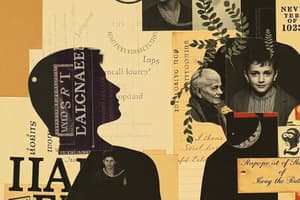Podcast
Questions and Answers
What is the primary factor contributing to false memory during retrieval?
What is the primary factor contributing to false memory during retrieval?
- The distinctiveness of the probe item
- The global similarity to existing memories (correct)
- The number of items rehearsed at study
- The intensity of rehearsal at study
Which of the following statements is true regarding the endorsement of probe words?
Which of the following statements is true regarding the endorsement of probe words?
- Probe words with lower similarity will always be rejected.
- Similarity to a single memory dictates the endorsement process.
- Endorsement is based on the randomness of memory retrieval.
- High similarity values lead to endorsement of probe words. (correct)
Why does increasing the number of similar items in memory lead to greater false memory?
Why does increasing the number of similar items in memory lead to greater false memory?
- It complicates the retrieval process.
- It creates confusion about distinct items.
- It raises the global similarity index. (correct)
- It enhances the rehearsal of the items.
How does forewarning affect false memory generation?
How does forewarning affect false memory generation?
Which probe word is least likely to be endorsed based on similarity consideration?
Which probe word is least likely to be endorsed based on similarity consideration?
What is indicated by the term 'global similarity' in memory retrieval?
What is indicated by the term 'global similarity' in memory retrieval?
Regarding false memories, which statement is accurate?
Regarding false memories, which statement is accurate?
Which test item is likely to be accepted as having been studied due to high similarity?
Which test item is likely to be accepted as having been studied due to high similarity?
What does fuzzy trace theory suggest about the types of memory traces used during retrieval?
What does fuzzy trace theory suggest about the types of memory traces used during retrieval?
Why does increasing the number of associates potentially lead to more false memories?
Why does increasing the number of associates potentially lead to more false memories?
In the context of activation monitoring theory, why is forewarning ineffective in reducing false memories?
In the context of activation monitoring theory, why is forewarning ineffective in reducing false memories?
What results from the activation of associated memories according to activation monitoring theory?
What results from the activation of associated memories according to activation monitoring theory?
How do critical lures become activated in the context of spreading activation models?
How do critical lures become activated in the context of spreading activation models?
What concept explains why both verbatim and gist traces can lead to different memories being recalled?
What concept explains why both verbatim and gist traces can lead to different memories being recalled?
How does the distance between words affect their activation within spreading activation models?
How does the distance between words affect their activation within spreading activation models?
What main factor contributes to the construction of false memories during retrieval according to fuzzy trace theory?
What main factor contributes to the construction of false memories during retrieval according to fuzzy trace theory?
What phrase was used by the experimental group in Loftus & Palmer's study that resulted in higher speed estimates?
What phrase was used by the experimental group in Loftus & Palmer's study that resulted in higher speed estimates?
In Lindsay's (1990) study, which condition led to less misinformation being reported?
In Lindsay's (1990) study, which condition led to less misinformation being reported?
What effect did the post-identification feedback have on witnesses according to Wells and Bradfield (1998)?
What effect did the post-identification feedback have on witnesses according to Wells and Bradfield (1998)?
What was the primary focus of the 'lost in the mall' study by Loftus and Pickerell (1995)?
What was the primary focus of the 'lost in the mall' study by Loftus and Pickerell (1995)?
Which of the following was a finding from Wade et al.'s (2002) hot air balloon study?
Which of the following was a finding from Wade et al.'s (2002) hot air balloon study?
What is suggested about memories in terms of susceptibility to misinformation?
What is suggested about memories in terms of susceptibility to misinformation?
What phenomenon was observed when participants were given misleading information immediately after viewing an event?
What phenomenon was observed when participants were given misleading information immediately after viewing an event?
What is the main implication of the misinformation effect in real-world scenarios?
What is the main implication of the misinformation effect in real-world scenarios?
What are flashbulb memories characterized by?
What are flashbulb memories characterized by?
What is a critical limitation of Brown and Kulik's study on flashbulb memories?
What is a critical limitation of Brown and Kulik's study on flashbulb memories?
What significant finding did Neisser and Harsch discover in their study on flashbulb memories?
What significant finding did Neisser and Harsch discover in their study on flashbulb memories?
According to Talarico and Rubin's findings, how does the accuracy of flashbulb memories compare to ordinary memories?
According to Talarico and Rubin's findings, how does the accuracy of flashbulb memories compare to ordinary memories?
What is one reason proposed for why flashbulb memories may be inaccurate?
What is one reason proposed for why flashbulb memories may be inaccurate?
In the studies on flashbulb memories, what changes were noted in later recollections?
In the studies on flashbulb memories, what changes were noted in later recollections?
What major events are often associated with flashbulb memories as examples?
What major events are often associated with flashbulb memories as examples?
What effect does emotional content have on flashbulb memories?
What effect does emotional content have on flashbulb memories?
What is a significant criticism of the claim that traumatic memories are often repressed?
What is a significant criticism of the claim that traumatic memories are often repressed?
Which factor may contribute to interference in memory recall?
Which factor may contribute to interference in memory recall?
What does the ‘memory wars’ debate primarily focus on?
What does the ‘memory wars’ debate primarily focus on?
How do flashbulb memories differ from regular memories?
How do flashbulb memories differ from regular memories?
What technique used by therapists can lead to the creation of false memories?
What technique used by therapists can lead to the creation of false memories?
Which statement best reflects Freud's theory about traumatic memories?
Which statement best reflects Freud's theory about traumatic memories?
Why might memories of trauma be intrusive for individuals with PTSD?
Why might memories of trauma be intrusive for individuals with PTSD?
When recalling an event, what can cue stronger recollections according to the context provided?
When recalling an event, what can cue stronger recollections according to the context provided?
Flashcards are hidden until you start studying
Study Notes
Fuzzy Trace Theory
- Explains how false memories form: During retrieval, both verbatim memory traces and gist memory traces are used to reconstruct memories.
- This theory explains several phenomena:
- Forewarning: Forewarning does not reduce false memories because the gist is still a useful cue to reconstruct an event.
- Increased associates: Increasing the number of associates increases false memory because a stronger extraction of gist traces occurs.
- False memories not generated at study: False memories can still occur because the gist is used at retrieval, or because the critical lure gets activated through a process of spreading activation.
Spreading Activation Theory
- This theory expands upon Fuzzy Trace Theory and posits that words we learn become activated, making them easier to retrieve later.
- Activation spreads from associated words, which can also be considered memories.
- This activation of associated memories can lead to false memory at retrieval.
Global Similarity Accounts
- Suggests that retrieval is determined by the similarity to all memories.
- When retrieving a memory, the similarity of the cue to all memories is calculated.
- The probe word is endorsed if the similarity to all items in memory is high enough.
Global Similarity Accounts and False Memory
- This theory explains several phenomena:
- Forewarning: Forewarning won't reduce false memory because it is an involuntary consequence of the similarity between memories and cues.
- Increased associates: More similar items in memory lead to greater global similarity, ultimately resulting in a greater chance of false memory.
- False memories not generated at study: Rehearsal is unnecessary for false memories to occur as the similarity between items is the deciding factor.
Misinformation Effect
- Demonstrates how false memories can be created through misleading information.
- The timing and context of the misinformation influences the likelihood of it impacting memory.
- Misinformation presented long after the event is easier to disregard.
False Childhood Memories
- Studies have demonstrated the creation of false memories for childhood events.
- The "Lost in the Mall" study showed that many participants described a story in detail even though it may never have occurred.
- The "Hot Air Balloon" study showed that participants were convinced that they had been in a hot air balloon as a child after being shown a doctored photo.
Misinformation Effect and Legal Proceedings
- The misinformation effect has implications for police interviews and legal proceedings as repeated misleading questions can influence witness memories.
- Post-identification feedback can influence a witness's confidence in their memory.
Flashbulb Memories
- Flashbulb memories are highly confident and vivid recollections of major life events.
- Brown and Kulik argued that these memories are preserved due to their high level of emotional content.
The Accuracy of Flashbulb Memories
- Studies have shown that flashbulb memories are not necessarily more accurate than other types of memories.
- Flashbulb memories are subject to reconstruction and are not perfect recordings.
- The frequency and vividness of retelling an event can lead to inaccurate memory.
Memory Wars
- The term refers to the debate about the existence and recoverability of repressed memories.
- Sigmund Freud argued that traumatic memories could be repressed, and that trained clinicians could unlock these memories.
- Beth Loftus and other researchers questioned the accuracy of recovered memories and argued that suggestive techniques could be used to create false memories.
Studying That Suits You
Use AI to generate personalized quizzes and flashcards to suit your learning preferences.




